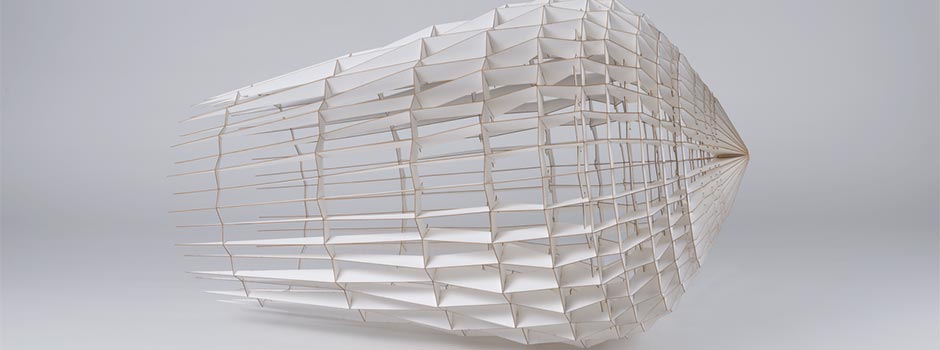
ART EXHIBITION AT THE THIRD LINE (Nov 19 – Dec 24, 2014) ‘Khalvat’ by Sahand Hesamiyan
Nov 01, 2014 Exhibition

_2014.jpg) Sahand Hesamiyan / Khalvat (metal prototype), 2014, Stainless Steel, 100x60x60 cm / Courtesy of The Third Line and the Artist
Sahand Hesamiyan / Khalvat (metal prototype), 2014, Stainless Steel, 100x60x60 cm / Courtesy of The Third Line and the Artist
The show is based around, and named after, the main sculpture Khalvat – a Persian word that translates to a hidden, private sanctum. Linking science and geometry to the abstract nature of spirituality, it is a reflective attempt to discover the esoteric nature of Iranian culture through the dissection of its architectural forms. Khalvat adopts the traditional triangular form of Rasmi, with the artist exposing through the superficial layers of the structure to offer a look towards the inward and sacred, by juxtaposing the external embellished Iranian architecture with its abandoned equivalent, transparent and accessible in its carcass form.
Traditional Iranian Islamic architecture is introverted, enclosed and recondite. The final creation is inaccessible, and can’t be appreciated completely at a glance or discovered in the initial survey. Intricate ornamental details, superfluity of architectural elements and richness of colors and shades make external envelopment impenetrable for a person to understand the structure within. Preserved with mystery and grandiosity, traditional Iranian architecture is almost inscrutable.
The task set by the artist is to search for the truth, which in Sufi tradition should be found in a clear form. In that sense, layers are peeled apart, opening to the viewer an ability to discover meaning, spirit and the core. 'Khalvat' is a result of comprehensive research in attempting to find a coherent structure in Iranian architecture, and with it a cultural framework itself.
_2014_02.jpg) Sahand Hesamiyan / Khalvat (paper maquette), 2014, cardboard, cyanoacrylate adhesive, 100x60x60 cm each / Courtesy of The Third Line and the Artist
Sahand Hesamiyan / Khalvat (paper maquette), 2014, cardboard, cyanoacrylate adhesive, 100x60x60 cm each / Courtesy of The Third Line and the Artist
_2014_03.jpg) Sahand Hesamiyan, Khalvat (paper maquette), 2014, cardboard, cyanoacrylate adhesive, 100x60x60 cm / Courtesy of The Third Line and the Artist
Sahand Hesamiyan, Khalvat (paper maquette), 2014, cardboard, cyanoacrylate adhesive, 100x60x60 cm / Courtesy of The Third Line and the Artist
Sahand Hesamiyan was born in Tehran in 1977 and graduated from Tehran University with a BFA in Sculpture in 2007. Sahand has exhibited in a number of group shows in Iran, UK, USA, Italy, Mexico and Saudi Arabia since 1999; Solo exhibitions include those held at Ave Gallery, Tehran, Aun Gallery, Tehran and Project Space presentation at The Third Line, Dubai. He has also participated in six Biennials and Symposiums in Tehran from 2005 to 2014, including the 1st Sculpture Biennial for Urban Space in Tehran (2008). Sahand won the first prize at the Padide International Symposium of Contemporary Iranian Sculpture (2014), was a finalist for the Magic of Persia Contemporary Art Prize (2009), was the winner of the Municipality Prize of the 4th Contemporary Iranian Sculpture Biennial, and has received awards for the 1st Tehran Steel Sculpture Symposium, 1st Tehran International Sculpture Symposium and the Fajr e Noor Exhibition. Sahand’s works are included in Delfina Entrecanales Collection, The Samawi Collection and MAC Collection and numerous private collections. Sahand is a member of the managing board of the 6th Tehran Contemporary Sculpture Biennial. He currently lives and works in Tehran.
_2014_620.jpg) Sahand Hesamiyan, Khalvat (paper maquette), 2014, cardboard, cyanoacrylate adhesive, 100x60x60 cm / Courtesy of The Third Line and the Artist
Sahand Hesamiyan, Khalvat (paper maquette), 2014, cardboard, cyanoacrylate adhesive, 100x60x60 cm / Courtesy of The Third Line and the Artist
The Third Line is a Dubai-based art gallery that represents contemporary Middle Eastern artists locally, regionally and internationally. The Third Line also hosts non-profit, alternative programs to increase interest and dialogue in the region. Represented artists include: Abbas Akhavan, Ala Ebtekar, Amir H. Fallah, Arwa Abouon, Babak Golkar, Ebtisam Abdulaziz, Farhad Moshiri, Fouad Elkoury, Golnaz Fathi, Hassan Hajjaj, Hayv Kahraman, Huda Lutfi, Joana Hadjithomas & Khalil Joreige, Laleh Khorramian, Lamya Gargash, Monir Shahroudy Farmanfarmaian, Pouran Jinchi, Rana Begum, Sahand Hesamiyan, Sara Naim, Sherin Guirguis, Shirin Aliabadi, Slavs and Tatars, Sophia Al-Maria, Tarek Al-Ghoussein, Youssef Nabil and Zineb Sedira.
Comments
Add a comment